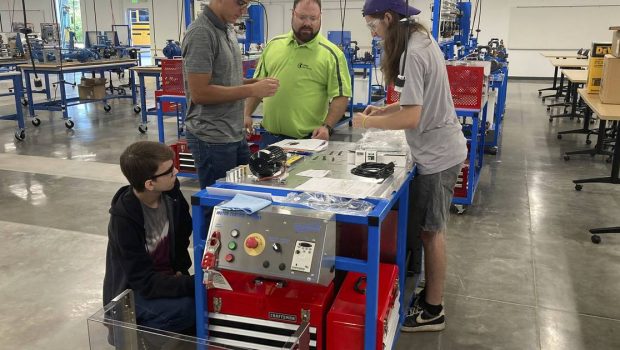First group of students learning high-tech skills as CLC’s Advanced Technology Center
Crystal Garcia is a College of Lake County freshman from Mundelein who comes from a family of mechanics. Now, she is learning how to weld metal at the college’s new Advanced Technology Center so she can join her father and brothers in the same trade.
“It gives me a sense of pride,” Garcia said during a welding class Thursday. “I look at it and see I made something.”
Garcia is one of 230 College of Lake County students learning industrial technology, welding or fabrication at the $34 million Advanced Technology Center in Gurnee, which welcomed its first cohort of students in late August to train for skilled industrial jobs.
While Garcia and her classmates were learning welding as sparks flew from the booths which comprise part of the laboratory, a class of local high school students was schooled on how to mount motors in the industrial technology lab.
Dave Wooten, the industrial technology teacher, moved from table to table showing students how to select the proper tool to work with the motors. He asked which tool was correct. They knew the answer and he showed them where to find it in the large tool boxes beneath the table.
Cody Morris and Jeffrey Chraca, Wauconda High school juniors, were two of the students. They like the opportunity to learn while doing, and the satisfaction of seeing success happen quickly in front of them.
“It’s especially stimulating to see what we’re making right before our eyes,” Chraca said. “I do well with hands-on learning when I can see what I’m doing.”
“We’re learning to use the tools of the trade,” added Morris.
The industrial technology students were part of the college’s dual-credit program. The teens are not only earning credit toward their high school diploma, but the grade they earn will also count toward a college degree.
With a classroom setting created to look like a modern factory, Richard Ammon, the college’s interim vice president of education and chief academic officer, said students get more than a hands-on education for a future in-demand, well-paying job.
“This is what they’ll see when they go to work,” Ammon said, as she pointed to the large, high-ceiling, well-lit industrial technology classroom. “They get advanced training and advanced skills.”

Along with learning how to weld using tools themselves, students in the welding and fabrication program work with welding robots. Ali O’Brien, the school’s vice president for community and workforce partnerships, said they learn how to program the robot to perform welding tasks.
“We teach them how to program the welding, how to troubleshoot the welding and to fix the robot when it’s not working properly,” O’Brien said. “This is very high-tech.”

Depending on their skill and educational level in welding, fabrication or industrial technology, Ammon said graduates can expect to earn between $37,000 and $63,000 a year.
As students work toward their associate degree over a two-year period, Ammon said they can also obtain certificates in industrial trades which will make them more marketable to land jobs with Lake County manufacturers, and more valuable to those employers.
“We want them to learn local, stay local and earn local,” Ammon said. “It’s exponential. They will pass what they know to their children, and their children’s children. It helps manufacturers in Lake County developing the industrial workforce here.”
Kevin Considine, the president and CEO of Lake County Partners, said the Advanced Technology Center will make an important contribution to the area’s manufacturing community, which is large and diverse.
“When this is fully built out, it will be the most significant investment in Lake County in a really long time,” Considine said. “This is a really big deal. It is of huge importance to the spread of manufacturing in Lake County.”
With 70,000 square feet currently in use for the two programs and the common area for student collaboration and community gatherings, Ammon said there is open space in the former big box store to expand to 180,000 square feet to add additional programs.
Ammon said the college is looking at a variety of options for the unused space, but nothing definite is planned. There is not a specific timetable for expansion, but a fundraising effort is underway. Training precision Machinists is a goal.








Gloss